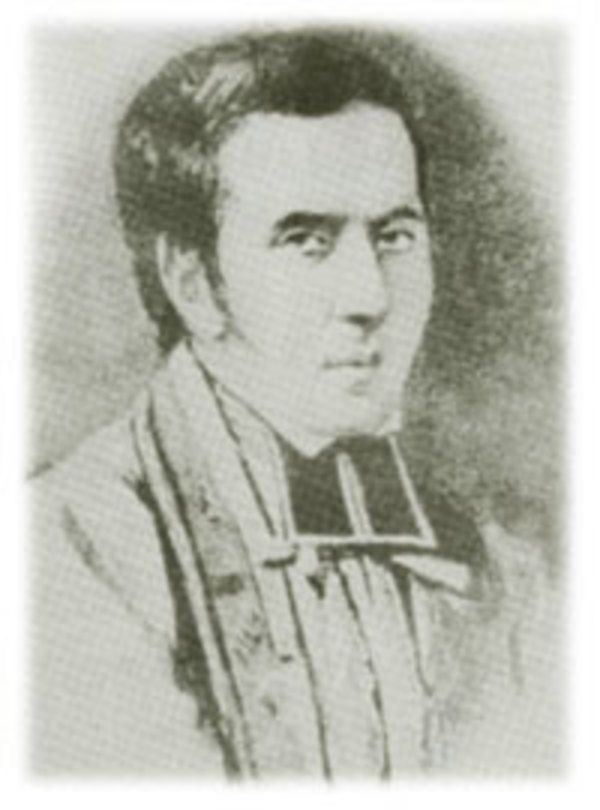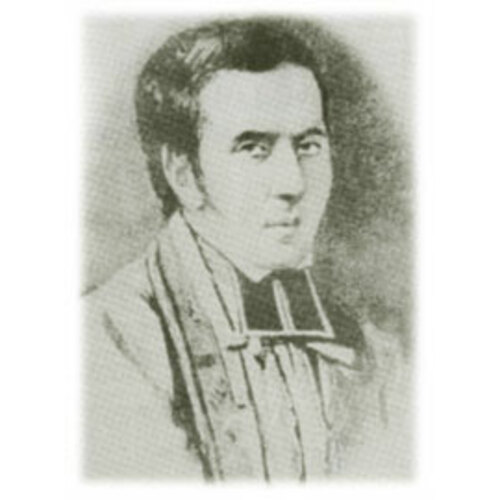
Source: Link
MAILLOUX, ALEXIS, secular priest, vicar general, temperance advocate, and missionary in Illinois; b. 8 Jan. 1801 at Île-aux-Coudres (Charlevoix County), L.C., son of Amable Mailloux and Thècle Lajoie; d. 4 Aug. 1877 at Île-aux-Coudres, Que.
In the autumn of 1814 Abbé Jérôme Demers* made the acquaintance of the young Alexis Mailloux at Île-aux-Coudres, and because of his family’s poverty offered him free instruction at the seminary of Quebec. In May 1825 Bishop Joseph-Octave Plessis* ordained him to the priesthood.
Abbé Mailloux began his pastoral life as chaplain (1825–29), then first parish priest (1829–33), of Saint-Roch de Québec. After some months officiating at Fraserville (Rivière-du-Loup), he was required by his bishop to go to work among the student body of the young college of Sainte-Anne-de-la-Pocatière (Kamouraska County). Ill prepared to devote himself to education, opposed by temperament to the laxity of the founder-superior of the institution, Abbé Charles-François Painchaud*, in matters of discipline and administration, he went so far as to challenge the promitto of the priesthood (the vow of obedience to the bishop), in the hope of declining his superior’s invitation. Consequently it was without enthusiasm, and even with the greatest repugnance, that he agreed to become director of the college, a post he held until 1838.
In that year, following the death of the founder, he received advancement, and became parish priest of Sainte-Anne and superior of the parish college. Also in 1838 he was appointed vicar general of the diocese. During the ten years or so that followed, his vocation as preacher and writer became clear. Indeed, from that time on his correspondence abounds in details about his pastoral concerns. The evils he castigated and fought were drunkenness, luxury, immorality in all forms, and especially neglect on the part of parents in bringing up their children properly and watching their associates. The remedies he advocated were temperance societies, an extension of the role of confraternities or pious associations, the use of indulgences, and the use of parish retreats, which he inaugurated in the diocese.
All the same, it was the setting up of retreats that he liked best, the more because a sedentary life did not suit his personality. During the decade 1840–50, he contemplated in turn joining the Oblates of Mary Immaculate, founding a society of preaching priests of which he would be the head, and becoming a missionary in British Columbia or the Saguenay. To satisfy these aspirations, Bishop Joseph Signay* finally agreed, in 1847, to release him from his parish, to enable him to give himself exclusively to preaching in the diocese. After ten years of an itinerant ministry as preacher and colonizing missionary, Mailloux left Canada to go to combat Charles-Paschal-Télesphore Chiniquy*’s schismatics in Illinois. Returning to Canada, he was parish priest of Saint-Bonaventure-d’Hamilton (Bonaventure County) from 1863 to 1865. After that, preaching and writing took up the rest of his life.
Mailloux’s written work is extensive. Among the best known titles are: La croix présentée aux membres de la Société de tempérance; L’ivrognerie est l’œuvre du démon . . . ; Essai sur le luxe et la vanité des parures . . . ; and Manuel des parents chrétiens ou devoirs des pères et des mères . . . . This last work reproduces the content of his first sermons given at retreats. Its distribution and therefore its influence – the fifth edition was in 1927 – did not diminish in the 20th century; indeed in 1945 the Bulletin des recherches historiques recommended it for French Canadian homes because it “is best adapted to our ideas and needs.”
The ideas of Vicar General Mailloux were inspired by the rigorism that owed its prevalence to Jansenist ethics, as were those of the 19th-century French Canadian clergy as a whole. Hence there is nothing surprising in the fact that he felt little sympathy for his “materialistic and mechanistic century.” As a whole his teaching was based on a rejection of the world and still more on a fear of God and hell. Furthermore, his impetuous temperament carried him away while he was preaching. In 1863, during a retreat of 40 hours at Sainte-Claire, Dorchester, his homily so scared the congregation that many complained and did not want to confess their sins. Consequently Bishop Charles-François Baillargeon* once deemed it expedient to say to Mailloux: “One must beware of arbitrariness; of the rigorism that damns many and saves no one; of the exaggeration that . . . falsifies consciences; of the excess that finds sin where there is none.”
Alexis Mailloux’s writings are many; his best known titles are: La croix présentée aux membres de la Société de tempérance (Québec, 1850); Essai sur le luxe et la vanité des parures spécialement dédié aux personnes de la campagne (Sainte-Anne-de-la-Pocatière, Qué., 1867); L’ivrognerie est l’cœuvre du démon, mais la sainte tempérance de la croix est l’œuvre de Dieu (Québec, 1867); Manuel des parents chrétiens ou devoirs des pères et des mères dans l’éducation religieuse de leurs enfants (Québec, 1851).
AAQ, Registres des lettres des évêques de Québec. Archives de l’évêché de Sainte-Anne (La Pocatière, Qué.), Paroisse de Sainte-Anne; Collège de Sainte-Anne (original letters of Mailloux, 1834–47). Archives du collège de Sainte-Anne-de-la-Pocatière (Qué.), Fonds Alexis Mailloux (large collection of original documents concerning Mailloux, 1834–47). ASQ, Polygraphie, L, LI, LII, LIII (Mailloux’s correspondence during his years in the United States). Julienne Barnard, Mémoires Chapais; documentation, correspondance, souvenirs (4v., Montréal et Paris, 1961–64), I. N.-E. Dionne, Sainte-Anne de la Pocatière,1672–1910; l’Île-aux-Oies,1646–1910 (Galerie historique, III, Québec, 1910), 82–85, 87–95, 129; Vie de C.-F. Painchaud; prêtre, curé, fondateur du collège Sainte-Anne de la Pocatière (Québec, 1894), 206–57. Wilfrid Lebon, Histoire du collège Sainte-Anne-de-la-Pocatière (2v., Québec, 1948–49), I, 39–79. Fernand Porter, L’institution catéchistique au Canada; deux siècles de formation religieuse, 1633–1833 (Montréal, 1949). Marcel Trudel, Chiniquy (2e éd., [Trois-Rivières], 1955). “Le « Manuel des parents chrétiens »,” BRH, LI (1945), 242.
Cite This Article
Serge Gagnon, “MAILLOUX, ALEXIS,” in Dictionary of Canadian Biography, vol. 10, University of Toronto/Université Laval, 2003–, accessed December 28, 2025, https://www.biographi.ca/en/bio/mailloux_alexis_10E.html.
The citation above shows the format for footnotes and endnotes according to the Chicago manual of style (16th edition). Information to be used in other citation formats:
| Permalink: | https://www.biographi.ca/en/bio/mailloux_alexis_10E.html |
| Author of Article: | Serge Gagnon |
| Title of Article: | MAILLOUX, ALEXIS |
| Publication Name: | Dictionary of Canadian Biography, vol. 10 |
| Publisher: | University of Toronto/Université Laval |
| Year of publication: | 1972 |
| Year of revision: | 1972 |
| Access Date: | December 28, 2025 |



